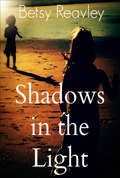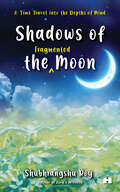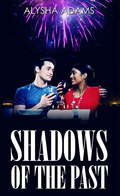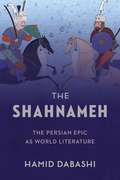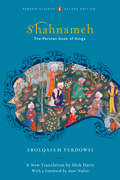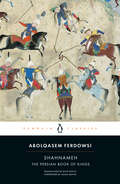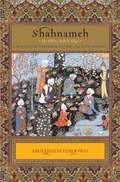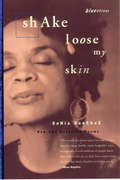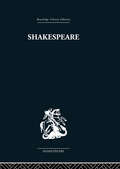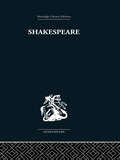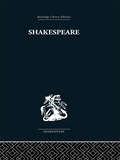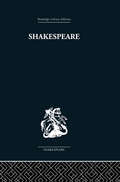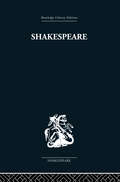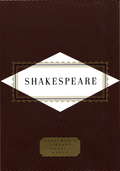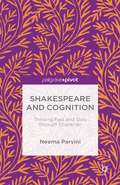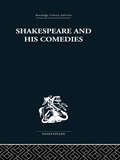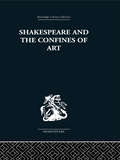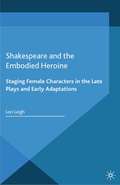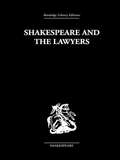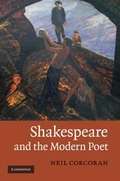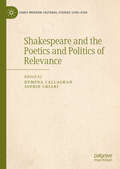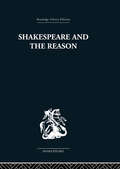- Table View
- List View
Shadows in the Light
by Betsy Reavley"Stark, beautiful and full of imagery." Shadows in the Light is a modern day testimony to the complexity of life and the difficulties we all face. These poems will resonate with experiences of its readers and prove poetry can speak for us all. This is the second collection of poetry by the author Betsy Reavley.
The Shadows of Poetry: Vergil in the Mind of Augustine (Transformation of the Classical Heritage #26)
by Sabine MacCormackImperial ceremony was a vital form of self-expression for late antique society. Sabine MacCormack examines the ceremonies of imperial arrivals, funerals, and coronations from the late third to the late sixth centuries A.D., as manifest in the official literature and art of the time. Her study offers us new insights into the exercise of power and into the social, political, and cultural significance of religious change during the Christianization of the Roman world.
Shadows of the Fragmented Moon: A Time Travel into the Depths of Mind
by Shubhrangshu RoyThis fullness is filled with fullness. Fullness is born from fullness. Fullness fills fullness. In fullness, fullness is ever rested. This collection of poems attempts to unlock the wisdom of our ancient seers for the benefit of the layfolk, often eulogised for their resilience in the face of depredations of time, but with no one to turn to—not even the gods—for succour, mercy, and redemption, and far removed from expensive and time-consuming modern psychiatric intervention. It has nothing to do with religion or rituals; nothing to do with an exclusive or an exclusivist lifestyle. Rather, these poems seek to help us cope with the circumstances that confront us on our eventful walk through life. In Shadows of the Fragmented Moon, each poem has a hidden and unexplored facet of human trait that needs confronting to clear the path of ill-informed illusions. For, as the seers have claimed down the ages, the mind is only an aggregate of desires and nothing else. We humans are a conglomerate of our emotions and reason . . . without purpose, without a second chance. Understanding this one truth alone sets us free.
Shah Husain
by Harjinder Singh DhillonOn the works of Shah Husain, 1539-1599, Panjabi Sufi poet; includes selections translated into English.
The Shahnameh: The Persian Epic as World Literature
by Hamid DabashiThe Shahnameh, an epic poem recounting the foundation of Iran across mythical, heroic, and historical ages, is the beating heart of Persian literature and culture. Composed by Abu al-Qasem Ferdowsi over a thirty-year period and completed in the year 1010, the epic has entertained generations of readers and profoundly shaped Persian culture, society, and politics. For a millennium, Iranian and Persian-speaking people around the globe have read, memorized, discussed, performed, adapted, and loved the poem.In this book, Hamid Dabashi brings the Shahnameh to renewed global attention, encapsulating a lifetime of learning and teaching the Persian epic for a new generation of readers. Dabashi insightfully traces the epic’s history, authorship, poetic significance, complicated legacy of political uses and abuses, and enduring significance in colonial and postcolonial contexts. In addition to explaining and celebrating what makes the Shahnameh such a distinctive literary work, he also considers the poem in the context of other epics, such as the Aeneid and the Odyssey, and critical debates about the concept of world literature. Arguing that Ferdowsi’s epic and its reception broached this idea long before nineteenth-century Western literary criticism, Dabashi makes a powerful case that we need to rethink the very notion of “world literature” in light of his reading of the Persian epic.
Shahnameh: The Persian Book of Kings
by Abolqasem Ferdowsi Dick DavisAmong the great works of world literature, perhaps one of the least familiar to English readers is the Shahnameh: ThePersian Book of Kings, the national epic of Persia. <P><P>This prodigious narrative, composed by the poet Ferdowsi between the years 980 and 1010, tells the story of pre- Islamic Iran, beginning in the mythic time of Creation and continuing forward to the Arab invasion in the seventh century.As a window on the world, Shahnameh belongs in the company of such literary masterpieces as Dante's Divine Comedy, the plays of Shakespeare, the epics of Homer-- classics whose reach and range bring whole cultures into view. In its pages are unforgettable moments of national triumph and failure, human courage and cruelty, blissful love and bitter grief.In tracing the roots of Iran, Shahnameh initially draws on the depths of legend and then carries its story into historical times, when ancient Persia was swept into an expanding Islamic empire. Now Dick Davis, the greatest modern translator of Persian poetry, has revisited that poem, turning the finest stories of Ferdowsi's original into an elegant combination of prose and verse. For the first time in English, in the most complete form possible, readers can experience Shahnameh in the same way that Iranian storytellers have lovingly conveyed it in Persian for the past thousand years.
Shahnameh
by Abolqasem Ferdowsi Dick Davis Azar NafisiThe definitive translation by Dick Davis of the great national epic of Iran--now newly revised and expanded to be the most complete English-language edition Dick Davis--"our pre-eminent translator from the Persian" (The Washington Post)--has revised and expanded his acclaimed translation of Ferdowsi's masterpiece, adding more than 100 pages of newly translated text. Davis's elegant combination of prose and verse allows the poetry of the Shahnameh to sing its own tales directly, interspersed sparingly with clearly marked explanations to ease along modern readers. Originally composed for the Samanid princes of Khorasan in the tenth century, the Shahnameh is among the greatest works of world literature. This prodigious narrative tells the story of pre-Islamic Persia, from the mythical creation of the world and the dawn of Persian civilization through the seventh-century Arab conquest. The stories of the Shahnameh are deeply embedded in Persian culture and beyond, as attested by their appearance in such works as The Kite Runner and the love poems of Rumi and Hafez. For more than sixty-five years, Penguin has been the leading publisher of classic literature in the English-speaking world. With more than 1,500 titles, Penguin Classics represents a global bookshelf of the best works throughout history and across genres and disciplines. Readers trust the series to provide authoritative texts enhanced by introductions and notes by distinguished scholars and contemporary authors, as well as up-to-date translations by award-winning translators.From the Trade Paperback edition.
Shahnameh: The Persian Book of Kings
by Azar Nafisi Dick Davis Abolqasem FeftdowsiBest most up-to-date English translation of the national epic of Iran.
Shake Loose My Skin
by Sonia SanchezAn extraordinary retrospective covering over thirty years of work, Shake Loose My Skin is a stunning testament to the literary, sensual, and political powers of the award-winning Sonia Sanchez.
Shakespeare: The Poet in his World
by M. C. BradbrookFirst published in 1978. In this study, Shakespeare's own life story and the development of English theatrical history are placed in the wider context of Elizabethan and Jacobean times, but the works themselves are the final objective of this 'applied biography'. The main contention of the book is that Shakespeare's life was the lure of the stage itself which inspired him to transform what everyday life provided into the worlds of Hamlet, King Lear and Prospero.
Shakespeare: The Cambridge Dover Wilson Shakespeare (cambridge Library Collection. Literary Studies) (Cambridge Dover Wilson Shakespeare Ser. #Vol. 17)
by George Ian DuthieFirst published in 1951. 'The book has the sterling qualities of shrewd sense and acumen that mark the 'rational' classical school of Shakespeare criticism.' Notes and Queries 'Professor Duthie's approach is direct and extremely objective. With no axe to grind, he pays impartial court to most of the great schools of Shakespearian criticism.' Cambridge Daily News 'Professor Duthie has much to say that is wise and judicious'. Times Literary Supplement. Contents include: Shakespeare's Characters and Truth to Life; Shakespeare and the Order-Disorder Antithesis; Comedy; Imaginative Interpretation and Troilus and Cressida; History; Tragedy; The Last Plays.
Shakespeare: The Dark Comedies to the Last Plays: from satire to celebration (Shakespeare Survey Ser. #44)
by R A FoakesFirst published in 1971. This volume explains and analyses the last plays of Shakespeare as dramatic structures. Beginning from the dark comedies, the author describes the ways in which Shakespeare was affected by the new techniques and possibilities for drama opened up by the innovations of the years after 1600, notably by the rise in children's companies. The main line of development of Shakespeare's dramatic skills is shown as leading from the dark comedies, through the late tragedies, to the last plays. A major part of the book is devoted to analyses of Cymbeline, The Winter's Tale, The Tempest and King Henry VIII.
Shakespeare: The art of the dramatist (Princeton Legacy Library #1782)
by Roland Mushat FryeThis edition first published in 1982. Previous edition published in 1972 by Houghton Mifflin. Outlining methods and techniques for reading Shakespeare's plays, Roland Frye explores and develops a comprehensive understanding of Shakespeare's drama, focussing on the topics which must be kept in mind: the formative influence of the particular genre chosen for telling a story, the way in which the story is narrated and dramatized, the styles used to convey action, character and mood, and the manner in which Shakespeare has constructed his living characterizations. As well as covering textual analysis, the book looks at Shakespeare's life and career, his theatres and the actors for whom he wrote and the process of printing and preserving Shakespeare's plays. Chapters cover: King Lear in the Renaissance; Providence; Kind; Fortune; Anarchy and Order; Reason and Will; Show and Substance; Redemption and Shakespeare's Poetics.
Shakespeare (Shakespeare Survey Ser. #Series Number 7)
by Allardyce NicollFirst published in 1952. An invaluable introduction to Shakespeare, this book places Shakespeare's work and criticism against the background of Elizabethan life in its historical, social, political, religious, linguistic and literary aspects. Contents include: The Problem of Interpretation; Shakespeare at Work; Man and Society; Man and the Universe; The Inner Life.
Shakespeare: Poems
by William ShakespeareThe Everyman's Library Pocket Poets hardcover series is popular for its compact size and reasonable price which does not compromise content. Poems: Shakespeare contains selections from Shakespeare's work, including his sonnets, his narrative poems Venus and Adonis and The Rape of Lucrece, songs and speeches, and an index of first lines.
Shakespeare, Alchemy and the Creative Imagination
by Margaret HealyShakespeare's Sonnets and A Lover's Complaint constitute a rich tapestry of rhetorical play about Renaissance love in all its guises. A significant strand of this is spiritual alchemy: working the 'metal' of the mind through meditation on love, memory work and intense imagination. Healy demonstrates how this process of anguished soul work - construed as essential to inspired poetic making - is woven into these poems, accounting for their most enigmatic imagery and urgency of tone. The esoteric philosophy of late Renaissance Neoplatonic alchemy, which embraced bawdy sexual symbolism and was highly fashionable in European intellectual circles, facilitated Shakespeare's inscription of an interior drama of a desiring mind creating poetry. Arguing that Shakespeare's incorporation of alchemical textures throughout his late works is indicative of an artistic stance promoting religious toleration and unity, this book sets out a crucial new framework for interpreting the 1609 poems, and transforms our understanding of Shakespeare's art.
Shakespeare and Cognition: Thinking Fast and Slow through Character
by N. ParviniShakespeare and Cognition challenges orthodox approaches to Shakespeare by using recent psychological findings about human decision-making to analyse the unique characters that populate his plays. It aims to find a way to reconnect readers and watchers of Shakespeare's plays to the fundamental questions that first animated them. Why does Othello succumb so easily to Iago's manipulations? Why does Anne allow herself to be wooed by Richard III, the man who killed her husband and father? Why does Macbeth go from being a seemingly reasonable man to a cold-blooded killer? Why does Hamlet take so long to kill Claudius? This book aims to answer these questions from a fresh perspective.
Shakespeare and his Comedies
by John Russell BrownFirst published in 1957. This edition reprints the second edition of 1962.The originality, vitality and variety of Shakespeare's comedies do not suggest a writer at ease with a formula which works to his own satisfaction and the pleasure of his audience; against first impressions they suggest an artist seeking to express an idea which is always eluding a completely developed presentation. The second edition of this book contains an extensive new chapter on Pericles, Cymbeline, The Winter's Tale and The Tempest.
Shakespeare and the Confines of Art
by Philip EdwardsFirst published in 1968. By selective study of certain of the comedies, tragedies and sonnets, Philip Edwards views Shakespeare's work as a whole and explains why his art developed as it did. The work which the author sees Shakespeare striving to create is the perfect fusion of comedy and tragedy and he suggests that we are watching the progress of a mind as acutely conscious as anyone today of the disorder and lack of meaning in the world. Nevertheless, it remains faithful to the possibility that within the imaginable forms of drama there exists that play which will satisfy the basic human need for reassurance, order and control.
Shakespeare and the Embodied Heroine: Staging Female Characters in the Late Plays and Early Adaptations (Palgrave Shakespeare Studies)
by L. LeighShakespeare and the Embodied Heroine is a bold new investigation of Shakespeare's female characters using the late plays and the early adaptations written and staged during the seventeenth and eighteenth century.
Shakespeare and the Lawyers
by O Hood PhillipsFirst published in 1972. Shakespeare's writing abounds with legal terms and allusions and in many of the plays the concept and working of the law is a significant theme. Shakespeare and the Lawyers gives a comprehensive survey of what Shakespeare wrote about the law and lawyers, and what has been written, particularly by lawyers, about Shakespeare's life and works in relation to the law. The book first reviews the recorded facts about Shakespeare's life and works, and his connection with the Inns of Court. It then discusses legal terms, allusions and plots in the plays; Shakespeare's treatment of the problems of law, justice and government; his description of lawyers and officers of the law; his references to actual legal personalities; and his trial scenes. Two further chapters consider the criticisms that have been made of Shakespeare's law, and the contribution to Shakespeare studies by lawyers.
Shakespeare and the Modern Poet
by Neil CorcoranShakespeare is a major influence on poets writing in English, but the dynamics of that influence in the twentieth century have never been as closely analysed as they are in this important study. More than an account of the ways in which Shakespeare is figured in both the poetry and the critical prose of modern poets, this book presents a provocative new view of poetic interrelationship. Focusing on W. B. Yeats, T. S. Eliot, W. H. Auden, Ted Hughes and Sylvia Plath, Neil Corcoran uncovers the relationships - combative as well as sympathetic - between these poets themselves as they are intertwined in their engagements with Shakespeare. Corcoran offers many enlightening close readings, fully alert to contemporary theoretical debates. This original study of influence and reception beautifully displays the nature of poetic influence - both of Shakespeare on the twentieth century, and among modern poets as they respond to Shakespeare.
Shakespeare and the Poetics and Politics of Relevance (Early Modern Cultural Studies 1500–1700)
by Dympna Callaghan Sophie ChiariFour years on from George Floyd’s murder, this volume asks if and how Shakespeare might be relevant—whether in performance, in the classroom, or in scholarship—to the pressing issues of social and climate justice. This question, however, is accompanied by the acute and uncomfortable recognition that there have been other consequences to the awakening of the world since Floyd's death, including the call to cancel Shakespeare altogether. This volume, however, is not an apology for Shakespeare but rather an engagement with him. From the perspective of the scholars who contribute here, questions about Shakespeare in our current context are not only deeply enmeshed with issues about his historical, geographical, and performance context and its attendant alterity, but crucially also to the specifically literary forms and structures with which he worked. Even as these essays resist the idea of a “timeless,” universalist Shakespeare, they insist upon the “poetics,” the creative framework, the specifically literary dimensions of the plays that cannot be reduced to any paraphrasable content. These are precisely the features that facilitate and enable the “relevance” of Shakespeare’s works even across the chasm of the centuries since he composed them.
Shakespeare and the Reason: A Study of the Tragedies and the Problem Plays
by Terence Hawkes'Mr Hawkes is a good critic, oriented towards history of ideas. He operates on the formula that Shakespeare was interested in the available distinctions between discursive and intuitive reason, and disliked a growing tendency for the first to be thought of as manly and the second effeminate. One sees how this action-contemplation polarity works, in Hamlet for instance, and Mr Hawkes thinks the kind of choices forced on tragic heroes can be better understood in terms of it.' Frank Kermode, New Statesman. In the seven plays on which the book concentrates, Terence Hawkes finds Shakespeare investigating the operation of two opposed forms of reason, and constructing dramatic metaphors such as the opposition between appearance and reality, or that between true 'manliness' and its false counterpart, which express to the full the tragic nature of the situation.
